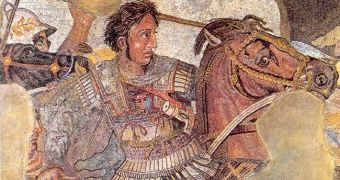In his conquest of the world, Alexander the Great founded the legendary city of Alexandria when he reached Egypt. But new traces found underwater reveal a city existing on the same place at least seven centuries before the arrival of Alexander, which was even mentioned in Homer's Odyssey (describing the adventures on the way back home of the Greek hero Odysseus or Ulysses, the inventor of the Trojan horse, with which the Greeks defeated Troy).
Alexandria was founded in the Egyptian Mediterranean coast in 332 B.C. and was famous for its library, the largest in the ancient world and its lighthouse at the island of Pharos, included amongst the Seven Wonders of the Ancient World.
The city was known to develop on a settlement called Rhakotis (R?-Kedet), vaguely mentioned as a modest fishing village. But 7 rod-shaped samples of dirt encountered on the seafloor of Alexandria's harbor point there may have been a thriving urban center there as far back at 1000 B.C.
The team from the Smithsonian's National Museum of Natural History employed vibrating hollow tubes to gently extract three-inch (8 cm) wide rods of sediment 6-18 ft (2-5.5 m) long from up to 20 ft (6.5 m) underwater.
"Alexandria now is home to as many as 4 million people, and we were in the unfortunate position of having to deal with their discharge-human waste, municipal waste, industrial waste-which got released into the harbor. It's not funny, but you have to sort of laugh." said coastal geoarchaeologist Jean-Daniel Stanley, one of the researchers.
His team found in the sediment ceramic shards, high levels of lead (most likely employed in construction), building stones originated from elsewhere in Egypt and organic material that could have come from sewage, all pointing to a city presence before the Alexander's arrival.
"Alexandria was built on top of an existing, and perhaps quite important, settlement, maybe one that was minimized in importance because we can't see it now," Stanley told LiveScience.
"Nothing really concrete about Rhakotis has been discovered until now."
Alexander must have chosen this zone because it had a protective bay against fierce winter storms in the Mediterranean. "There are very few places in the Egyptian Mediterranean coast where the coastline is not smooth. This would have been the best place to establish a harbor." Stanley said.
These lyrics in the Odyssey refer to this area: "Now in the surging sea an island lies, Pharos they call it. By it there lies a bay with a good anchorage, from which they send the trim ships off to sea."
This city could have been a heaven for the Greeks, Minoans, Phoenicians and others, but future research is required.
"Virtually nothing is known of the people who would have lived there," Stanley said.

 14 DAY TRIAL //
14 DAY TRIAL //